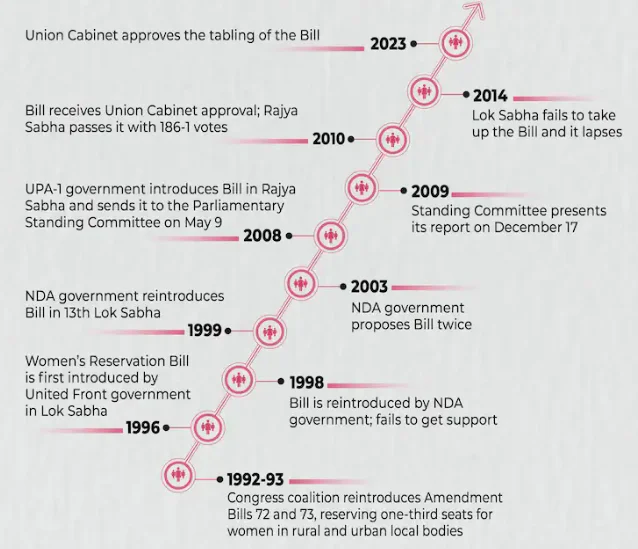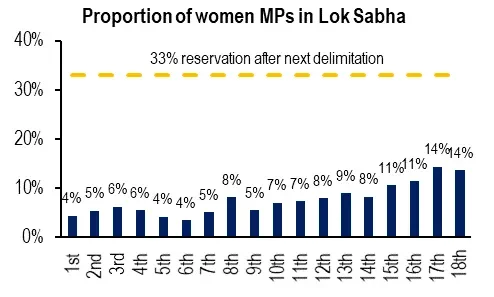The Constitution (106th Amendment) Act, 2023, aims to improve women’s representation in Indian politics by reserving one-third of seats for women in the Lok Sabha and State Assemblies. Despite the passing of this act, women’s participation remains low, reflecting ongoing challenges in a patriarchal political landscape. Addressing these barriers is crucial for achieving true gender equality in governance.
Women Reservation Act: A Step Towards Gender Equality in Parliament
Brief History of the Women Reservation Act (Nari Shakti Vandan Adhiniyam, 2023)
- Introduction: The women’s reservation bill has a long and tumultuous history, facing multiple challenges since its inception.
- Legislative Attempts: Various bills to reserve seats for women in parliament and state assemblies were introduced in 1996, 1998, 1999, and 2008.
- Lapsed Bills: The first three bills lapsed due to the dissolution of their respective Lok Sabhas.
- 2008 Bill: Passed by Rajya Sabha but lapsed with the dissolution of the 15th Lok Sabha; examined by the Standing Committee.
- Setbacks
- 2014: The bill faced its final setback, lapsing due to unresolved issues of sub-reservations for OBC and SC/ST categories.
- Passage of the Nari Shakti Vandan Adhiniyam, 2023
- Near-Unanimous Support: The bill received strong support in both Lok Sabha and Rajya Sabha.
- Reservation Mandate: Ensures one-third reservation for women in the Lok Sabha, state assemblies, and the Legislative Assembly of Delhi.
- Implementation Concerns
- Delayed Implementation: Actual implementation is tied to the completion of the decennial census and delimitation of seats, with uncertain timelines.
- Expert Predictions: Experts predict it may not be implemented in time for the 2029 Lok Sabha elections.
- Political Context
- Nationalistic Tone: The act carries overt nationalistic themes, particularly relevant in light of the 2024 elections.
- Ambiguous Goals: The intent to empower “narishakti” lacks clarity in terms of actionable plans.
- Future Vision: Aiming for a “Vikasit Bharat” by 2047 raises questions about the political implications of the terminology used.
- Swift Tabling: The rapid introduction of the act after years of delay prompts further analysis of its political timing and motivations.
Enroll now for UPSC Online Course
Timeline of the Women Reservation Act

Nari Shakti Vandan Adhiniyam, 2023: Reserving Seats for Women in Parliament and State Assemblies
- Constitution (106th Amendment) Act, 2023: It was passed by the Parliament of India to ensure one-third reservation for women in the Lok Sabha (Lower House of the Parliament), State Assemblies, and the Legislative Assembly of the National Capital Territory of Delhi.
- Implementation Timeline: It shall come into effect after the first exercise of delimitation is undertaken after this amendment act.
Key Provisions
- Articles Amended: Article 239AA of the Constitution was amended to reserve one-third of seats for women in the Legislative Assembly of the National Capital Territory of Delhi.
- Articles Inserted: Three new articles were inserted into the Constitution:
- Article 330A: Reserves one-third of seats for women in the Lok Sabha, including seats reserved for Scheduled Castes (SCs) and Scheduled Tribes (STs).
- Article 332A: Reserves one-third of seats for women in the State Assemblies, including seats reserved for SCs and STs.
- Article 334A: Specifies that the Act shall come into effect after the next delimitation of constituencies, has a 15-year sunset clause, and allows for extension and periodic rotation of seats by law.
Need for Women’s Reservation
- Under-representation: Women currently hold about 14% of seats in the Indian Parliament and an average of 8% in State Assemblies.
- International Comparison: India lags behind neighboring countries regarding women’s representation in the Lower House of the Parliament.
- Political Inequality: The low representation of women in politics contributes to India’s poor ranking in the Global Gender Gap report (126 out of 146 countries in 2023).
- Patriarchal Politics: Affirmative action is necessary due to the patriarchal nature of political parties and the barriers faced by women in entering politics.
- Gender-sensitive Policy: Women’s representation is essential for addressing societal issues such as crime against women and low labour force participation.
- Local Level Evidence: Reservations at local levels have led to improved crime reporting and access to amenities.

Concerns with the Act
- Principle of Equality: Reservations may be seen as violating the principle of merit-based competition and equality.
- Voter Choice: Legislative seat reservations may restrict voter self-determination.
- Homogeneity: Women do not form a homogeneous group like castes, and different arguments may apply.
- Political Empowerment: Broader electoral reforms are needed for the true political empowerment of women or the phenomenon, like Sarpanch Pati in Panchayats would emerge in these legislative bodies also.
- State Disparities: Variations in the application of reservations across states and the rotation of seats.
- Upper Houses: No provisions for reservations in the Rajya Sabha (upper house of Parliament) or State Legislative Councils.
Suggestions
- Implementation: Census data and delimitation should be conducted promptly for timely implementation of the Act.
- Capacity Building: Training and mentorship programs for women leaders should be enhanced to improve their mobilization and effectiveness.
Enroll now for UPSC Online Course
| Must Read | |
| Current Affairs | Editorial Analysis |
| Upsc Notes | Upsc Blogs |
| NCERT Notes | Free Main Answer Writing |
Conclusion
The 106th Amendment represents a significant step towards enhancing women’s representation in Parliament. However, simply reserving seats is not enough; active measures must be taken to empower women and promote their leadership.
- Ongoing support and reforms are essential to break down the barriers that limit women’s participation.
- By fostering a more equitable political environment, India can harness the diverse perspectives of women for effective governance and social progress.
Sign up for the PWOnlyIAS Online Course by Physics Wallah and start your journey to IAS success today!

 GS Foundation
GS Foundation Optional Course
Optional Course Combo Courses
Combo Courses Degree Program
Degree Program










